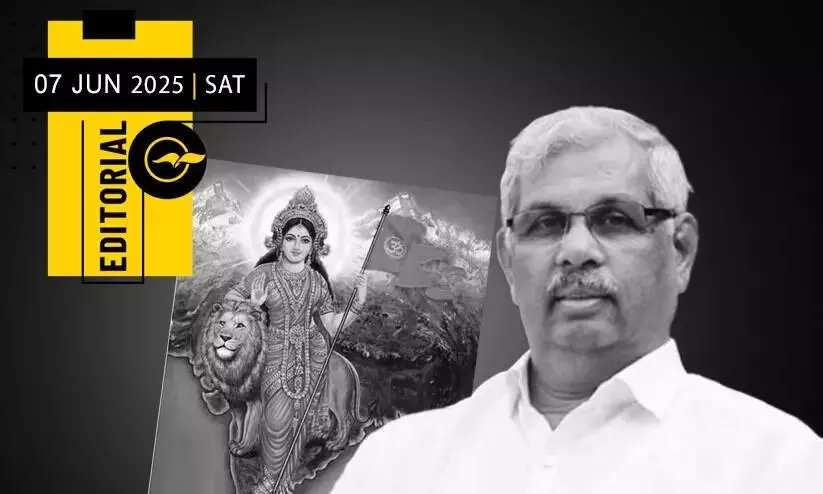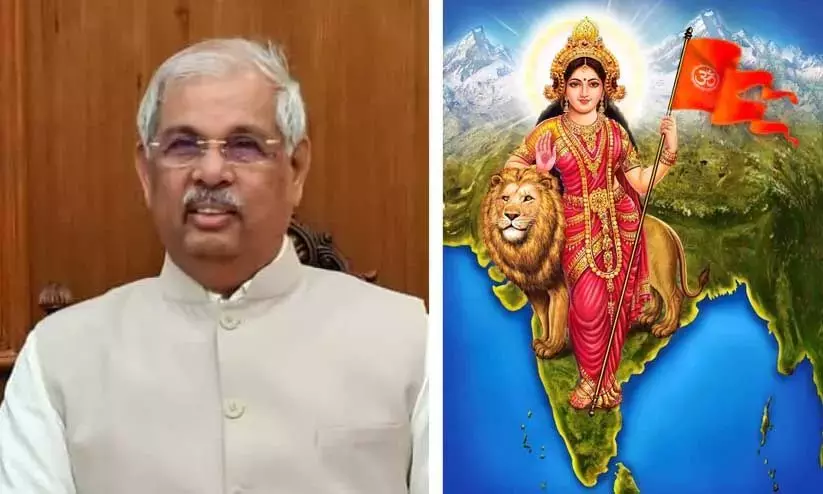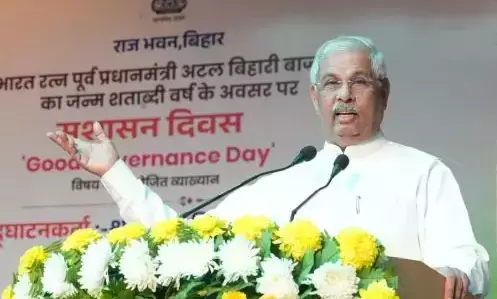
The saffron flag at the Raj Bhavan
text_fieldsThe concept of 'parallel governance' carried out by the central government through governors in opposition-ruled states is well known. Since September 6, 2019, when Arif Mohammad Khan was sworn in as Kerala's governor, Malayalis have experienced this phenomenon, often referred to as 'Governor Raj'. This is not limited to Kerala alone. Across states where the central government's directives are not readily accepted, this pattern has been evident since the first day of Modi's government. On one hand, economic sanctions and restrictive measures are imposed on opposition-ruled states; on the other, governors intervene in governance through Raj Bhavans, often in a supervisory manner. This has become a standard approach adopted by the central government. Governors have unnecessarily interfered in state policies, blocked bills passed by state cabinets, and exercised executive authority in a way that positions them as de facto presidents within state governance. States like Kerala, Tamil Nadu, Punjab, and West Bengal have all faced significant challenges due to this practice. In some cases, this interference has even paralysed governance. Opposition-ruled states have challenged this trend in the Supreme Court, with Tamil Nadu’s government filing a petition that led to a landmark ruling on April 8. The Supreme Court strongly criticised 'Governor Raj', stating that governors must not unnecessarily delay bills passed by state governments and must make timely decisions. The bench, led by Justices J.B. Pardiwala and R. Mahadevan, emphasised that governors cannot indefinitely withhold assent, marking a setback for the central government’s approach. The fact that the president had to directly intervene to protect the central government in this matter adds another layer of complexity to the issue. Meanwhile, after a brief pause, new controversies are emerging centred around the Kerala Raj Bhavan, particularly after Agriculture Minister P. Prasad boycotted a World Environment Day event due to allegations that it was organised in a manner resembling an RSS gathering. In response, the Kerala government held a separate event at the state secretariat, further escalating tensions between the Raj Bhavan and the government.
The new controversy revolves around the installation of a portrait of Bharat Mata holding a saffron flag at Raj Bhavan after Rajendra Arlekar took charge as Kerala's governor. The Governor had directed that floral tributes be offered to this portrait as part of the World Environment Day event’s commencement, but Agriculture Minister P. Prasad found this unacceptable. The saffron flag-bearing Bharat Mata is primarily used by the RSS. Therefore, turning a government’s official event into an RSS gathering is, according to the state government, unconstitutional. Citing this concern, state representatives left Raj Bhavan and moved to the Darbar Hall at the Secretariat. Reports suggest that Agriculture Minister P. Prasad boycotted the Raj Bhavan event after consulting with the Chief Minister. Regardless, his decision has received strong support from Kerala’s secular community. Meanwhile, the CPI strongly criticised the Governor and demanded that the President intervene and recall him. The broader secular community in Kerala has largely sided with the state government on this issue. At the same time, the Governor remains firm in his stance. This incident is expected to have repercussions in state politics and governance. After Arif Mohammad Khan stepped down, the appointment of Rajendra Arlekar—an RSS-affiliated figure—as Kerala’s governor was expected to lead to a more confrontational phase of Governor Raj. However, surprisingly, the initial interactions between the Governor and the state government followed a path of cooperation. Just weeks ago, their cordial relationship was evident even at the Kerala Sree Awards ceremony. Given the current developments, whether this marks a permanent shift in their dynamic remains to be seen.
The latest developments have made the shift in the governor’s approach more evident. In Kerala, Arif Mohammad Khan, and in Tamil Nadu, R.N. Ravi, were known for their direct interventions in governance, often aligning with the central government’s agenda to exert pressure on opposition-ruled states. Their actions were widely perceived as efforts to impose central directives on state governments. However, Rajendra Arlekar’s approach appears different. While there was initially a delay in continuing Arif Khan’s style of governance, it is now clear that Arlekar is moving towards a more explicitly RSS-aligned agenda. He has also directly associated himself with the ideological line of the RSS. Just days ago, RSS ideologue S. Gurumurthy delivered a speech at Raj Bhavan, centred around Operation Sindoor, an event framed within a specific ideological context. The speech sparked widespread criticism, and before the controversy had subsided, a new dispute emerged during the World Environment Day celebrations. In short, the presence of the saffron flag at Raj Bhavan makes it clear that Arlekar has made his intentions known through this symbolic stance. The democratic community must remain vigilant in observing this shift.




















